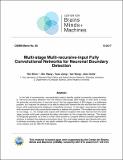Multi-stage Multi-recursive-input Fully Convolutional Networks for Neuronal Boundary Detection
Author(s)
Shen, Wei; Wang, Bin; Jiang, Yuan; Wang, Yan; Yuille, Alan L.
DownloadCBMM-Memo-080.pdf (2.512Mb)
Metadata
Show full item recordAbstract
In the field of connectomics, neuroscientists seek to identify cortical connectivity comprehensively. Neuronal boundary detection from the Electron Microscopy (EM) images is often done to assist the automatic reconstruction of neuronal circuit. But the segmentation of EM images is a challenging problem, as it requires the detector to be able to detect both filament-like thin and blob-like thick membrane, while suppressing the ambiguous intracellular structure. In this paper, we propose multi-stage multi-recursive-input fully convolutional networks to address this problem. The multiple recursive inputs for one stage, i.e., the multiple side outputs with different receptive field sizes learned from the lower stage, provide multi-scale contextual boundary information for the consecutive learning. This design is biologically-plausible, as it likes a human visual system to compare different possible segmentation solutions to address the ambiguous boundary issue. Our multi-stage networks are trained end-to-end. It achieves promising results on two public available EM segmentation datasets, the mouse piriform cortex dataset and the ISBI 2012 EM dataset.
Date issued
2017-10-01Publisher
Center for Brains, Minds and Machines (CBMM)
Series/Report no.
CBMM Memo Series;080